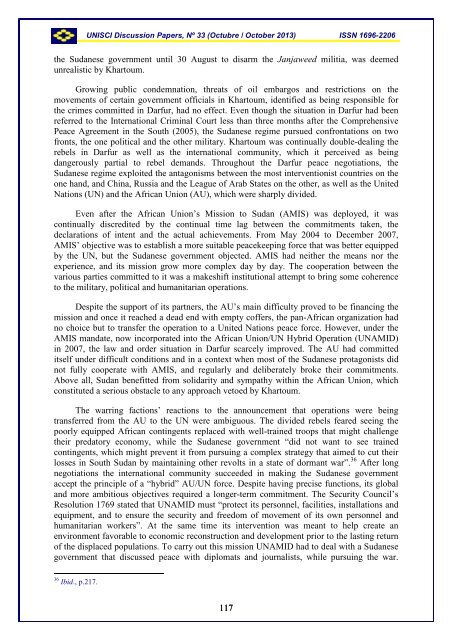UNISCI - Universidad Complutense de Madrid
UNISCI - Universidad Complutense de Madrid
UNISCI - Universidad Complutense de Madrid
Create successful ePaper yourself
Turn your PDF publications into a flip-book with our unique Google optimized e-Paper software.
<strong>UNISCI</strong> Discussion Papers, Nº 33 (Octubre / October 2013) ISSN 1696-2206the Sudanese government until 30 August to disarm the Janjaweed militia, was <strong>de</strong>emedunrealistic by Khartoum.Growing public con<strong>de</strong>mnation, threats of oil embargos and restrictions on themovements of certain government officials in Khartoum, i<strong>de</strong>ntified as being responsible forthe crimes committed in Darfur, had no effect. Even though the situation in Darfur had beenreferred to the International Criminal Court less than three months after the ComprehensivePeace Agreement in the South (2005), the Sudanese regime pursued confrontations on twofronts, the one political and the other military. Khartoum was continually double-<strong>de</strong>aling therebels in Darfur as well as the international community, which it perceived as beingdangerously partial to rebel <strong>de</strong>mands. Throughout the Darfur peace negotiations, theSudanese regime exploited the antagonisms between the most interventionist countries on theone hand, and China, Russia and the League of Arab States on the other, as well as the UnitedNations (UN) and the African Union (AU), which were sharply divi<strong>de</strong>d.Even after the African Union’s Mission to Sudan (AMIS) was <strong>de</strong>ployed, it wascontinually discredited by the continual time lag between the commitments taken, the<strong>de</strong>clarations of intent and the actual achievements. From May 2004 to December 2007,AMIS’ objective was to establish a more suitable peacekeeping force that was better equippedby the UN, but the Sudanese government objected. AMIS had neither the means nor theexperience, and its mission grow more complex day by day. The cooperation between thevarious parties committed to it was a makeshift institutional attempt to bring some coherenceto the military, political and humanitarian operations.Despite the support of its partners, the AU’s main difficulty proved to be financing themission and once it reached a <strong>de</strong>ad end with empty coffers, the pan-African organization hadno choice but to transfer the operation to a United Nations peace force. However, un<strong>de</strong>r theAMIS mandate, now incorporated into the African Union/UN Hybrid Operation (UNAMID)in 2007, the law and or<strong>de</strong>r situation in Darfur scarcely improved. The AU had committeditself un<strong>de</strong>r difficult conditions and in a context when most of the Sudanese protagonists didnot fully cooperate with AMIS, and regularly and <strong>de</strong>liberately broke their commitments.Above all, Sudan benefitted from solidarity and sympathy within the African Union, whichconstituted a serious obstacle to any approach vetoed by Khartoum.The warring factions’ reactions to the announcement that operations were beingtransferred from the AU to the UN were ambiguous. The divi<strong>de</strong>d rebels feared seeing thepoorly equipped African contingents replaced with well-trained troops that might challengetheir predatory economy, while the Sudanese government “did not want to see trainedcontingents, which might prevent it from pursuing a complex strategy that aimed to cut theirlosses in South Sudan by maintaining other revolts in a state of dormant war”. 36 After longnegotiations the international community succee<strong>de</strong>d in making the Sudanese governmentaccept the principle of a “hybrid” AU/UN force. Despite having precise functions, its globaland more ambitious objectives required a longer-term commitment. The Security Council’sResolution 1769 stated that UNAMID must “protect its personnel, facilities, installations an<strong>de</strong>quipment, and to ensure the security and freedom of movement of its own personnel andhumanitarian workers”. At the same time its intervention was meant to help create anenvironment favorable to economic reconstruction and <strong>de</strong>velopment prior to the lasting returnof the displaced populations. To carry out this mission UNAMID had to <strong>de</strong>al with a Sudanesegovernment that discussed peace with diplomats and journalists, while pursuing the war.36 Ibid., p.217.117
















